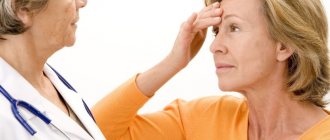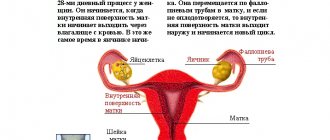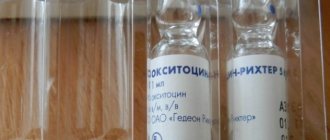What to do before your first period comes?
Girls' first period is an important and very significant event. It is difficult to describe the feelings that you will experience. During the first period, a teenager will have to deal with strange and new sensations. There may be thousands of thoughts running through your head at once, but you have nothing to fear.
On the contrary, it would be reasonable to think: “When I get my period, I will really become an adult.” You must prepare for this exciting event. Try to relax and unwind.
Whenever your first menstruation begins, remember: this is a natural process in the female body, thanks to which a girl can perform a real miracle - give life to a baby.
How can you tell if your period is about to start? there are several signs
Often the signs before menstruation turn out to be false. For example, due to a lack of vitamins and sleep, girls begin to feel the listed symptoms. However, my period seemed to have recently ended. They may not come at all, because it is too early.
To understand how long your next menstruation is, you can do a pharmacy ovulation test. It is recommended to buy it after 11-14 days from the start of the last menstruation. It is better to buy several tests at once and monitor their results when the 11th day arrives.
The test will help determine when ovulation is approaching. If it turns out to be positive, it is worth counting down two weeks - this is the date on which your period is planned.
Don't worry if your period is late by 2-5 days. The state of the body is influenced by many factors, among which we can even mention climatic conditions. Delaying a woman’s period is justified if:
- severe shocks;
- fasting, strict diets;
- sleepless nights;
- changes in climatic conditions.
Also, the cycle may change due to the onset of a new season - spring, summer, autumn, winter.
Critical days - questions and answers
Critical days give us a lot of trouble, and at the same time they sometimes bring us joy - when we are glad that another day has passed and we did not get pregnant))
This time we’ll talk about the most frequently asked questions, about menstruation and the answers to them. I think the material will mainly be useful to girls who have recently encountered their appearance. Although, any woman should know as much as possible about herself and her body. So if you are interested, read on...
- Why does your appetite increase a week before your period?
In the last days before menstruation, the ratio between the hormones produced by the ovaries, that is, estrogen and gestagen, changes. If the ovaries produce less progestogen than expected, then the third important hormone, androgen, increases its effect on the body. And it is worth highlighting the fact that it is the androgen hormone that stimulates appetite.
- Why do I get fat before my period, even though I eat the same?
You may have asked yourself this question more than once. And here’s the answer - in fact, you don’t get fat, it’s just that before your period, water is retained in the tissues more, so your arms and legs swell, and your breasts swell. But you can only gain a few kg.
- Why does my back hurt before my period?
Most often this occurs due to problems with the musculoskeletal system. But it can also happen due to problems with the uterus.
- Why do my nipples hurt so much 2 days before my period?
Due to a lack of the hormone gestogen in the body.
- Why does vaginal discharge begin the day before my period?
Hormonal levels drop and hence vaginal discharge occurs.
- Why do you want sex so much a week before your period?
Due to the composition of hormones, sexual appetite increases. There are significantly more male hormones.
- Why does one of the ovaries hurt during menstruation?
This can happen due to internal spasms of the uterus, as well as with incomplete ovulation, a cyst may appear on the left or right ovary, which gains fluid and grows, so pain may appear that radiates to one side or the other.
- Why do I get cramps in my stomach a few hours before my period starts?
Your body produces special substances that stimulate the contraction of the uterus, and when the uterus contracts, you feel cramps in the abdomen.
- How to cope with period pain?
Painful periods can be made less painful with gentle exercise and yoga. You can also drink soothing herbal teas, such as chamomile tea, St. John's wort tea, etc. Pharmacies sell special teas for pain during menstruation; they already contain everything you need. It is only important to start taking these teas 2-3 days before the start of your period.
- Why are periods sometimes heavy?
The abundance of the cycle depends on hormonal levels and stress. We are talking about hormones produced by the ovaries.
- On which days are your periods heavier than usual?
On the second and third days of the cycle, menstruation is the heaviest. It is then that the discharge occurs in large volumes.
12. Sometimes blood just flows, why?
Most often this happens when the body position changes. That is, if you lie down for a while and then get up, you will have the feeling that blood is pouring in large quantities, but in fact it was collecting in the vaginal space, and as soon as you stood up, it begins to leave this space.
13. Why do periods sometimes last 2 days and sometimes 5 days?
The number of periods is influenced by hormones and their levels in the body. And it can change depending on high blood pressure, problems with blood clotting, or some kind of infection.
14. Why do menstruation stop for a while, and then continue for a few more days? This is fine?
No, this is not normal. But this can happen when the cervix is temporarily blocked.
15. Why is the cycle late by 2-5 days, or, on the contrary, starts earlier?
This depends on the quality of the ovulation process, which occurs against a favorable hormonal background. In case of any hormonal changes, the beginning of the cycle also changes.
- Why do acne appear on the face and body before menstruation?
Because of hormones. The lack of the required amount of estrogens is to blame for this, which does not allow the skin to be oily, then acne does not appear on it.
- What tampon should I use and how often should I change it?
At the beginning of your period, the tampon should be changed every 3-4 hours, or even more often. As the tampon fills, you should feel some pressure on the vaginal walls. As for the size of the tampon, for heavy periods 4-6 drops, for scanty periods - 2 drops, etc.
18. Why do blood clots appear?
The appearance of blood clots is a bad sign that indicates some problems in your body. As a rule, the composition of menstruation does not allow blood clotting. Clots may appear due to some kind of infection, inflammation, etc.
- Why does heavy bleeding begin during sex immediately after the third day of menstruation?
The mucous membrane that forms at the end of menstruation is too thin and not durable, and can tear during sex, hence the bleeding.
- Why do I get a headache after my period?
The vessels that we have in our heads also work depending on the hormonal background. When your period ends, hormone levels drop sharply and headaches may begin.
- Pads or tampons, which is better?
Choose depending on your personal preferences, but remember that in case of any inflammation or infection of the genital organs, it is forbidden to use tampons.
- When I don’t take birth control pills, my periods are scanty, why?
Birth control pills contain certain hormones that affect ovulation, they smooth the lining of the uterus and soothe any cramping that may occur.
- Why do I get feverish during menstruation?
Depending on the amount of fluid in the body and depending on the amount of hormones, blood pressure changes, it drops and therefore causes fever. It can also cause fever in case of anemia or large blood loss in case of long and heavy periods.
- Does the weather affect your periods or not?
Menstruation is affected by hormonal levels. And when you have any sensations or emotions, it affects your hormonal levels, and accordingly your periods.
- During heavy periods, does a woman’s body lose vitamins and minerals?
No, but iron is lost, which causes depression and depression.
- Why do attacks of rage and sentimentality appear during menstruation?
Your mood depends on your hormonal levels. Also, when a woman is expecting a child, and instead of the desired pregnancy, she gets her period, she, of course, can be upset.
27. Is it possible to have sex during your period?
From a medical point of view, sex during menstruation is not contraindicated.
These are the most frequently asked questions about menstruation. If you have other questions, write, we will try to find answers together.
Rating: 9.2/ 10 (86 votes cast)Critical days - questions and answers, 9.2 10 86 ratings
Source: https://womensland.ru/vse-o-mesyachnyx/
Abdominal pain
Painful sensations in the lower abdomen and genitals often haunt a woman and appear several days before her period begins.
They are often accompanied by the following symptoms:
- nausea;
- headache;
- dizziness.
To prevent this condition, it is advisable to reduce physical activity on the body during this period.
There are cases when representatives of the fair sex, before their periods begin, are plagued by severe, sharp pains. When such symptoms appear, many of them cannot lead their usual lifestyle at all.
And the majority considers their condition to be normal, although such a clinical picture requires immediate consultation with a gynecologist who can diagnose the causes of the dysfunction in question.
How to understand that your period will end soon
Representatives of the fair sex monitor their menstrual cycle by keeping a special diary (or calendar), where they mark the last menstruation and count down the approach of the next one. At the same time, for many, the question remains how to find out when your period will come if such a diary has not yet been started, and it is impossible to remember the dates of the last critical days .
Cycle Features
A well-known fact is that the period occurs regularly and always on time, with the exception of pregnancy or some serious malfunction in the body.
The average statistical indicator of duration is considered to be a period of twenty-eight days. At the same time, not every girl’s body has such average indicators, and plus or minus three days is the norm.
In order to have an idea about the beginning of the cycle, you should specifically understand the changes that occur in the female body as the critical days approach. The countdown of the menstrual period usually begins from the day on which the same bloody discharge appears - the endometrium (the mucous membrane inside the uterus), which leaves the body in this way.
The duration of endometrial discharge lasts approximately three to five days. A week period is also considered the norm.
The follicle (a component of the ovarian structure) then matures, and the egg passes into the fallopian tube. With all this action, hormones are actively produced in the woman’s body. For this reason, there are distinct symptoms that the next period is approaching.
Symptoms of approaching menstruation
A nagging pain that appears out of the blue in the lower abdomen may indicate the approach of the menstrual period. In addition, at this time, nausea, dizziness, and headache may well begin. A good solution at this time would be to avoid strenuous physical activity so as not to provoke an increase in symptoms.
It is important to understand that you cannot get used to such pain, and if the symptoms are felt too strongly, then this is definitely a reason to consult a doctor.
Serious pain during the onset of the next cycle, which also occurs abruptly, can indicate a variety of abnormalities and pathologies.
These can be various infections, endometriosis (a disease with the growth of the endometrium), and tumors, including malignant ones.
You can also predict the number of days remaining until your period arrives by looking at your mammary glands. That's right, women's breasts usually have a noticeable reaction to the approach of their critical days. Thus, a few days before the start of the period, she may ache slightly. In this case, it is worth paying attention to the nature of the sensations.
And if they manifest themselves too strongly, then this may indicate the occurrence of diffuse mastopathy (rapid growth of connective tissue in the chest). If the pain begins to bother you, you should immediately consult a specialist, since in the later stages this disease is quite difficult to treat.
Natural secretions
During most stages of the menstrual cycle, clear discharge occurs. Bloody mucus comes out only for a few days. By the amount of discharge, it is also quite possible to determine the beginning of the critical days, since a couple of days before their arrival there is a little more light discharge.
If there is discharge in large quantities during the entire menstrual cycle (except for the days of endometrial discharge), this may indicate certain problems that need to be addressed in the gynecology office. Here are some of them:
- Erosion or cervicitis, a sign of which may be increased transparent discharge.
- Endometrial hyperplasia, polyps or endometriosis, which may be indicated by brownish discharge.
- If the discharge contains blood, and it appears several days before the start of the cycle, then this can also be a symptom of a serious pathology.
If you notice any of the above, you should consult a specialist immediately.
Changing temperature
Your body temperature may well be slightly elevated before your period arrives, and this is normal as long as your readings do not fluctuate too much. If the temperature rises seriously and this affects your well-being, in this case you should consult a doctor.
Throughout the entire period, a girl’s basal temperature (the lowest temperature during sleep) can be changeable. During the ovulation stage, the largest jump in temperature can be observed.
When the initial stage of the menstrual cycle begins, the basal temperature may well reach 37 degrees, and this is considered normal. After reaching this mark, it begins a gradual decrease until the time of ovulation arrives.
The reason for this is a serious release of the hormone progesterone (“pregnancy hormone”, an endogenous steroid that affects the menstrual cycle). This happens after the follicle ruptures.
From all this it is worth concluding that if the basal temperature is below 37 degrees, then the arrival of menstruation will be accurate.
What is PMS
The simplest method for determining when your period will come is considered to be PMS, that is, premenstrual syndrome.
Premenstrual syndrome is an incredibly complex system of changes in several conditions of a woman: cardiovascular, endocrine, psychological. Here is a list of the most common signs of premenstrual syndrome:
- sleep disturbance;
- insomnia;
- bloating;
- nausea;
- vomit;
- pain in the chest and lower back areas;
- increased appetite (accordingly, sudden weight gain).
Regarding changes in a woman’s psychological background, it is worth noting that during PMS she is most susceptible to stress and may suffer from severe depression. And, of course, there is that well-known irritability during premenstrual syndrome.
These signs do not always appear and not in every representative of the fair half of humanity. Despite this, the overwhelming majority of women determine the approximate number of days before the start of the cycle precisely by the onset of this syndrome.
It is also known that quite often a girl feels like she is pregnant during PMS. In fact, the body during the syndrome is in a state similar to the first weeks after fertilization of an egg by a sperm. The behavior is also quite similar.
Menstruation is the most important stage in a woman’s life, although it is far from the most pleasant. However, conception, pregnancy and birth of a child are impossible without the arrival of menstruation.
Often, both premenstrual syndrome and the critical days themselves pass along with unpleasant and even painful symptoms, while they are all quite tolerable and do not require any change in the usual lifestyle.
Anyway, in extreme cases, you can use a variety of medications designed to alleviate the various symptoms that appear during “these days.” You can get these drugs simply by visiting your nearest pharmacy.
Definition of the first day
How to understand that you are on your period if you have not encountered this before - there are many ways to do this, because a large number of physiological processes that you just need to pay attention to will be obvious. For example, the first signs of the imminent onset of a cycle will be changes in the ovaries and uterus, as well as breast enlargement.
For girls, their first period often appears between the ages of twelve and fourteen, but it may well appear earlier or a little later, and the first appearance at nine or fifteen years is the same norm. The first menstrual cycle always occurs along with changes in the girl’s appearance that occur due to growing up. Here are some examples of such changes:
- hair growth in the armpits, legs and pubic area;
- breast growth;
- the appearance of acne or pimples on the back or face.
All the first symptoms of menstrual periods are inextricably linked with changes in hormone production during growing up.
So, here are a couple of ways to find out when your period is coming:
- Beli. Some time before the onset of the very first menstrual cycle, light discharge from the vagina appears, which is called leucorrhoea. A girl may well unexpectedly find them on her underwear. Such discharge is quite natural and its occurrence signifies the maturation of a young organism. The first menstrual cycle itself will most likely come 1 or even 2 years after this light discharge first appears.
- PMS. This is a sign that menstruation will occur in just a few days. In this case, symptoms do not appear before the first menstruation, but approximately a year after the first cycle, when it is already fully established. There are pulling and aching pains in the lower abdomen and lower back, enlargement of the mammary glands and some soreness, and changes in mood. There is no need to worry as they are quite easy to deal with.
To maintain a feeling of freshness before your menstrual cycle begins, you should use panty liners. They are also recommended to be used if a girl does not know exactly when her first period will arrive and is worried that it will start unexpectedly. Among other things, such pads are quite suitable for small discharges during the period.
How to avoid getting into trouble
It is very easy to fall into a stupor and become confused if a girl’s first period begins unexpectedly for her and at the most inopportune time. First of all, don't worry.
You can feel confident if you use panty liners on a regular basis.
They will protect your clothes from the unexpected appearance of discharge and, therefore, feel much more at ease.
Considering that pads or ordinary tampons can be carried with you always and everywhere, this will allow the girl to be constantly ready for the start of the menstrual period in any situation and, if necessary, quickly resort to using these hygiene products.
The first menstruation, as a rule, is accompanied by real excitement among growing ladies. Here is a list of simple tips that will help you not fall into a state of panic when the first critical days arrive:
- Keep a menstruation calendar.
- Use pads daily during periods when discharge may appear.
- If, however, the discharge started for the first time and took you by surprise, and you don’t have any tampons or pads with you, you can turn to a friend, school teacher or nurse. They definitely have hygiene products.
- On the day when bleeding may begin, you should visit the toilet approximately once every 3 or 4 hours so as not to miss the onset of bleeding.
- Just in case, on the days when your first period begins, you can put a spare pair of underwear in your purse, in addition to pads or tampons.
If you use at least some of these tips, the likelihood that your first menstruation will go smoothly increases significantly. Fortunately, all this is not at all difficult .
Source: https://detishki.ahuman.ru/kak-ponjat-chto-skoro-zakonchatsja-mesjachnye/
Age at the end of menstruation
At what age will a woman’s period end? This is an important question, the answer to which all female representatives want and should know. Unfortunately, no gynecologist can give a clear answer to this question, since everything is purely individual. The female body is a very fragile and sensitive mechanism, which is based on the reproductive system and the hormones it produces.
Many factors can influence the malfunction of this mechanism. For some, menopause may begin earlier, for others later, but there are average norms - when menopause generally and most often occurs for most women. The onset of menopause and the end of menstruation most often occurs between 45-55 years.
Every month, in a cyclical rhythm, maturation of eggs occurs, which has been established since birth. For a woman’s entire life, a certain number of oocytes (egg embryos) are stored, the production of which begins at the beginning of puberty - at 11-15 years old, and ends at approximately 45-55, when, in fact, menopause occurs.
The onset of menopause is not sudden; it is always preceded by symptomatic features of premenopause, which occur in women after 40 years of age.
Ages for the end of menstruation in a woman
Menstruation is a sign of reproductive function. For the first time, menstrual periods begin in adolescence for the fairer sex. Many people know what time women’s periods end. This usually happens at 45-55 years of age. This period is called menopause or menopause.
The ovaries stop functioning normally. The supply of active eggs is running low. After menopause, a woman is not capable of successful fertilization and normal bearing of a baby. The skin and the body as a whole are actively aging.
A number of physiological changes occur in the body that contribute to a deterioration in well-being.
After 45-55 years, menstruation usually no longer occurs
At what age do menstruation end?
Monthly menstruation first appears during adolescence. The first periods appear at 11-15 years of age. It is during this period that girls also develop secondary sexual characteristics.
The age at which menopause occurs varies from person to person. It depends on many factors. It is at menopause that the supply of active eggs ceases. Part of it perishes throughout life, and the other part is used up monthly.
It is impossible to predict the exact age at which menstruation will stop completely. This usually occurs before age 55. Much depends on the hereditary predisposition and condition of the body. Various signs may indicate the imminent onset of menopause.
No one can say for sure when menopause will occur.
What symptoms indicate the onset of menopause?
The clinical picture will help to recognize the approaching menopause. Shortly before menstruation, a woman’s health deteriorates significantly. The main manifestations are presented in the table.
Psycho-emotional state From time to time, a woman may experience panic attacks. The woman constantly forgets whether she turned off electrical appliances or locked the house. The fairer sex becomes more irritable. A woman develops tearfulness that is uncharacteristic for her. Mood changes often. The girl's performance is significantly reduced.
| General health | General health deteriorates significantly. The main symptom is severe hot flashes. From time to time the girl experiences fever. There are surges in blood pressure. There is regular insomnia. There is weakness and a constant desire to sleep. Appetite may increase or, conversely, disappear. Nausea occurs periodically. |
Symptoms vary from person to person. For some women, premenopause is asymptomatic and does not cause any discomfort. However, this happens quite rarely.
Women often have a hard time going through menopause. The skin actively ages due to changes in hormonal levels. New wrinkles appear. The skin becomes less elastic and pleasant to the touch.
The skin ages faster and wrinkles appear
During menopause, sexual desire decreases. Due to the decrease in the amount of natural lubrication, sex causes severe discomfort.
Shortly before menopause, delays often appear. Menstruation may disappear for up to six months. Only over time will critical days disappear completely.
How does perimenopause go?
Premenopause is a period that is the initial stage of menopause. At this time, menstruation is still present, albeit with significant disruptions. Often this period begins at 40-45 years old and lasts about 5 years.
Gradually the intensity of the symptoms increases. Symptoms of the condition include:
- excessive sweating;
- flushes of blood;
- sleep disturbance;
- drying of mucous membranes;
- improper functioning of the endocrine system;
- excessive irritability and psycho-emotional instability;
- a sharp increase in blood pressure.
Many people have high blood pressure
The condition worsens due to hormonal instability. Menopause is not a disease. This is a physiological process that may occasionally require supportive care.
Ovulation gradually disappears. At first, menstruation is delayed by a week. Over time, this period can stretch to six months.
How does menopause go?
Menopause occurs when your last period passes. This period will last for a year. The woman begins to gradually get used to her new condition.
Sometimes menopause causes the following changes:
- decreased elasticity of the skin and its thinning;
- the appearance of a large number of new wrinkles;
- rapid weight gain.
Rapid weight gain begins
It is during this period that a woman needs support from loved ones. The girl should limit the influence of stressful situations. Any changes in psycho-emotional state lead to a deterioration in well-being.
A woman during menopause should rest more. At this time, it is almost impossible to get pregnant. The efficiency of the ovaries fades away.
Metabolism slows down, which means excess fluid is gained and body weight increases. During this period, it is advisable to completely abandon existing bad habits.
How does postmenopause go?
Postmenopause is diagnosed only when menstruation has been absent for a year. The main symptom of the condition is the complete cessation of ovarian function. The woman is no longer able to become pregnant and bear a child.
After menopause, the ovaries stop working
During postmenopause, the level of follicle-stimulating hormone increases. This can only be determined after testing.
What is the age at menopause associated with?
The period of menopause varies from person to person. Hereditary predisposition plays a fundamental role. Typically, a woman will run out of eggs by the same age as her immediate family.
Bad habits also have an impact. In women who smoke or drink, menstruation ends a couple of years earlier. If you are overweight, menopause is usually delayed by a year.
Various surgical interventions can also shorten the childbearing age. This is especially true for women who have had one ovary removed.
Early menopause is diagnosed when menstruation stops at age 40. This condition can be pathological. Violation has a bad effect on the psycho-emotional state. A comprehensive medical diagnosis is required.
This video talks about the age of menopause:
Late onset of menstruation can also be diagnosed. This is the result of the individual characteristics of the organism.
Delayed menstruation and pregnancy
Pregnancy is the most common cause of missed periods in women of childbearing age. In addition to a delay in menstruation, the probable occurrence of pregnancy is indicated by changes in taste and olfactory sensations, appetite, the appearance of nausea and vomiting in the morning, drowsiness, and painful sensations in the mammary glands.
The possibility of pregnancy cannot be rejected even in cases where there has been interrupted sexual intercourse, sexual contact during menstruation, on “safe” days or using a condom, in the presence of an intrauterine device, taking oral contraceptives, etc., since neither One method of contraception does not provide 100% contraceptive effect.
If there is a delay in menstruation, and in the previous month the woman had sexual intercourse, then pregnancy can be determined using special tests. The principle of operation of all pregnancy tests (test strips, tablet or inkjet) is the same: they determine the presence of human chorionic gonadotropin hormone (hCG or hCG) in the urine, the production of which begins in the body 7 days after fertilization of the egg.
The concentration of hCG in the urine increases gradually, and modern, even the most sensitive tests, are able to detect it only after a delay in menstruation and no earlier than 12-14 days after conception has occurred. It is necessary to “read” the test result in the first 5-10 minutes. The appearance of even a barely noticeable second stripe during this period of time indicates a positive result and the presence of pregnancy.
It should be remembered that while being sexually active, a woman can always become pregnant, so it is necessary to closely monitor the menstrual cycle and pay attention to delays in menstruation. However, a delay in menstruation can be caused not only by pregnancy, but also by a number of very other, sometimes very serious and dangerous to health reasons.
Reason to see a doctor
During the first menstruation, it is necessary to carefully monitor the girl’s well-being. Alarming symptoms requiring medical attention are:
- Too early onset of menstruation (before 9 years);
- Lack of an established cycle, a year after menarche;
- Excessively abundant or scanty discharge;
- The duration of menstruation is less than 2 or more than 7 days;
- The appearance of blood clots, pus inclusions, and an unpleasant odor.
Read
Also:
- First menstrual bleeding - Menarche
- Milk with iodine for abortion - the recipe has been removed because... dangerous to the life of the girl herself
- How to understand that a woman's menstruation has ended
- First period, how to tell your mom about your period
Recommendations
If a woman complains that her period came on the 18th day of her cycle, the reason for this must be determined by the doctor. Only after a final diagnosis has been made will it be possible to determine how to solve the problem. When developing a therapy method, the individual characteristics of a woman’s body, as well as her age, must be taken into account.
As for the treatment itself, it can be conservative or surgical. The first type of intervention is carried out when menstruation that arrives on the 16th day of the cycle is classified as ovulatory. If the bleeding is not associated with ovulation, then it is possible that surgery may be required, provided that the patient is not in adolescence.
When menstruation begins on the 14th day of the cycle, medical treatment is initially carried out, which includes taking hormonal drugs. If bleeding is associated with emotional shock or stress, it is possible that sedatives will be introduced into the therapeutic complex.
If a large volume of discharge is noted, then medications may be prescribed that replenish the level of iron in the body. It is also very important to balance your diet during therapy; you need to include beef, legumes, liver, vegetables and fruits in your diet. No less attention must be paid to sleep and wakefulness. To recover faster, it is recommended to get more rest.
For representatives of the fairer sex, it is always very important to understand why menstruation started in the middle of the cycle. Only an experienced gynecologist can help with this. That is why the main principle of prevention is regular visits to a female doctor.
To prevent the possibility of bleeding in the middle of the cycle, you should have regular sex life, take care in choosing contraception if you are not planning a pregnancy in the near future, lead an active lifestyle, play sports and give up bad habits.
It is very important to monitor the stability and regularity of menstrual bleeding and keep a calendar. If discharge occurs in each cycle without a clear schedule, then it is definitely necessary to undergo treatment, as well as be examined to identify pathologies that affect the functioning of the reproductive system in general and the ovaries in particular.
Recommendations from gynecologists
If a woman complains about the irregular appearance of her period, experts give some advice on how to understand that her period will begin soon:
- Maintaining a calendar. Almost every girl has a calendar that marks the beginning and end of her period. This method helps to remember at the right moment the end date of the last discharge. During a visit to the doctor, the calendar will help you calculate your individual menstrual cycle, detect the time when a malfunction occurs, and determine the cause of the problem. This method is also needed to calculate the days when you can conceive and when it is safe to have sex.
- Temperature measurement. During phases 3-4 of the menstrual cycle, the temperature rises slightly, which is evidence of the onset of ovulation. To determine the moment of egg release, daily measurement of basal temperature is required. That is, every day in the morning, without leaving your bed, you need to measure the temperature in the anus. During phases 1 and 2 of the cycle, its indicator is 36.5-36.8 °C. Then there is a decrease until ovulation occurs. When the egg is released, the temperature increases by 0.5-0.6 °C. This indicator remains at the same level for several days, then gradually decreases by the time of menstruation. Having noticed when the highest indicator is determined, we add 2 weeks to this number and get the estimated date for the onset of regulation.
- Carrying out an ovulation test. The easiest method for determining ovulation is to use a special pharmacy test. It helps to calculate the date of the onset of the ovulatory period, and by adding 14 days to it, we get the day of the next menstruation. The test helps you easily calculate when it is best to visit a gynecologist and get tested.
How to calculate the start of your period?
Those girls whose periods come irregularly (sometimes ahead of schedule, sometimes late) are recommended to use the following methods for calculating their critical days:
Almost every woman keeps her own “red calendar”, marking the first and last day of discharge. This method has been tested for several generations, but is more suitable for girls with a regular cycle. In any case, the calendar will not let you forget when the last critical days were. When visiting a gynecologist, using a calendar, you can calculate your personal menstrual cycle, see when a malfunction occurred and identify the cause. Also, favorable days for conception and a “safe” period are calculated by dates.
A slight increase in body temperature is observed in the second half of the menstrual cycle and indicates the beginning of ovulation. To know when the egg is released, you need to measure your basal temperature daily. To do this, every morning, without getting out of bed, the temperature in the anus is measured.
In the first half of the cycle, the temperature will be 36.5 – 36.8 C°. Then it gradually decreases until ovulation. Immediately after the release of the egg, the temperature rises sharply by 0.5 - 0.6 C°, lasts for several days and gradually decreases towards the beginning of menstruation. If we understand on what day the temperature rose sharply, all that remains is to add 14 days to this date. And it turns out the expected day of the beginning of menstruation.
Important! Taking hormonal medications does not allow you to accurately measure basal temperature.
An easier way to determine the ovulatory period is to use a special test that is sold at any pharmacy. Using the same test, the day of ovulation is calculated, two weeks are added to it, and the date of future menstruation is obtained. Thanks to the test, it is easy to calculate the day favorable for visiting a gynecologist and getting tested. And, of course, the best day to conceive.
The most reliable harbingers
Finding out that your period is starting soon is quite easy if you know a few special properties of your own body, and symptoms that just need to pay a little attention help determine the exact time intervals. How to find out when your period starts:
- The mammary glands swell. They increase in size, some engorgement of the female mammary glands appears, and slight pain is felt. There is also a slight discharge from the nipples, which later turns into a curdled secretion, which women do not immediately notice.
- When your period is about to begin, you feel a nagging pain in the lower abdomen as the uterus prepares to shed its inner layer (endometrium). In most cases, this is accompanied by unpleasant painful sensations, which most often depend on the individual properties of the body. In rare cases, such pain is associated with hormonal imbalance, so if obvious discomfort is detected, the best solution would be to consult a qualified gynecologist.
- Rashes may appear on the skin. This symptom is directly related to hormonal changes in the body on the eve of menstruation.
- When your period is due, lumbar pain appears. A fairly common symptom that is associated with various processes taking place in the uterus on the eve of menstruation.
- When your period comes, your bowels empty. This is a completely natural reaction of an organism with normal metabolism. In the time period before the onset of critical days, a woman’s body tries to get rid of everything unnecessary. In most cases, painful sensations on the eve of menstruation directly depend on excessive intestinal congestion and they disappear after a bowel movement.
Sometimes some other phenomena are recorded as precursors of menstruation, such as the desire to eat more, swelling of the lower extremities, and face. Some girls report a depressed state, which is called premenstrual syndrome, or PMS.
In what cases is it necessary to see a doctor?
Women mistake some symptoms of serious illnesses for signs of upcoming menstruation.
What should you be wary of?
- Sharp pain in the lower abdomen may indicate the development of a tumor, infection, or the onset of endometriosis.
- Pain in the chest - there may be diffuse mastopathy (formation of nodules in the mammary glands).
- Transparent discharge indicates the possible development of cervicitis, endometritis or cervical erosion.
- Brown discharge causes polyps and endometriosis.
Nervous breakdowns before menstruation do not always mean PMS, but may indicate a serious hormonal imbalance in a woman.
Even a developing pregnancy in the first weeks can give the same symptoms as the upcoming menstruation. Therefore, any alarming factors should be a reason to contact a gynecologist.
I am 13 years old, my period started 5 days ago, and what are the signs that my period will end soon?
Woman.ru experts
Find out the opinion of an expert on your topic
Dyachenko Elena Vladimirovna
Psychologist, Gestalt therapist in training. Specialist from the site b17.ru
Slobodyanik Marina Valerievna
Psychologist. Specialist from the site b17.ru
Zinovieva Natalya Yurievna
Psychologist. Specialist from the site b17.ru
Glinchikova Elena Viktorovna
Psychologist. Specialist from the site b17.ru
Nikulina Marina
Psychologist. Specialist from the site b17.ru
Sheludyakov Sergey
Psychologist, Clinical psychologist. Specialist from the site b17.ru
Trifonova Maria Anatolyevna
Psychologist. Specialist from the site b17.ru
Gundertailo Yulia Danilovna
Psychologist. Specialist from the site b17.ru
Vyacheslav Potapov
Psychologist, consultant. Specialist from the site b17.ru











